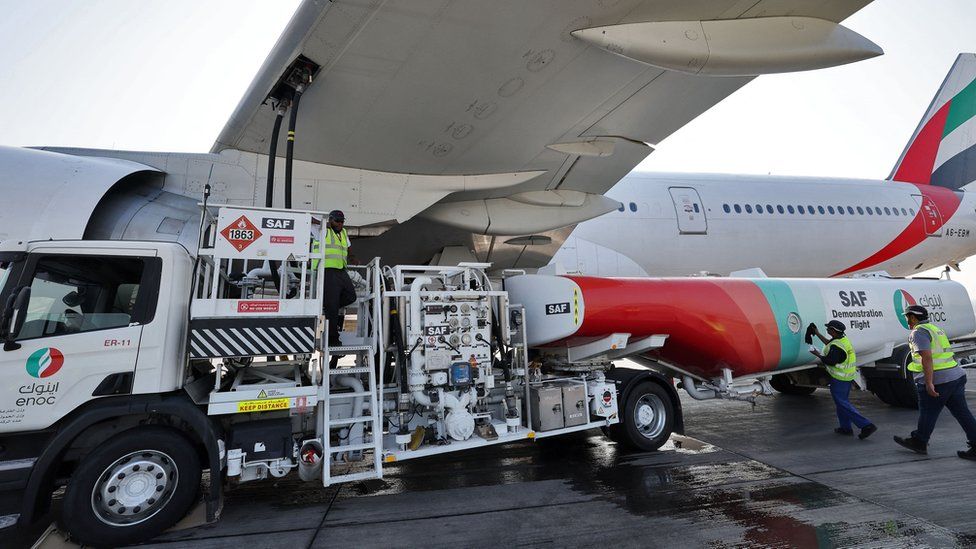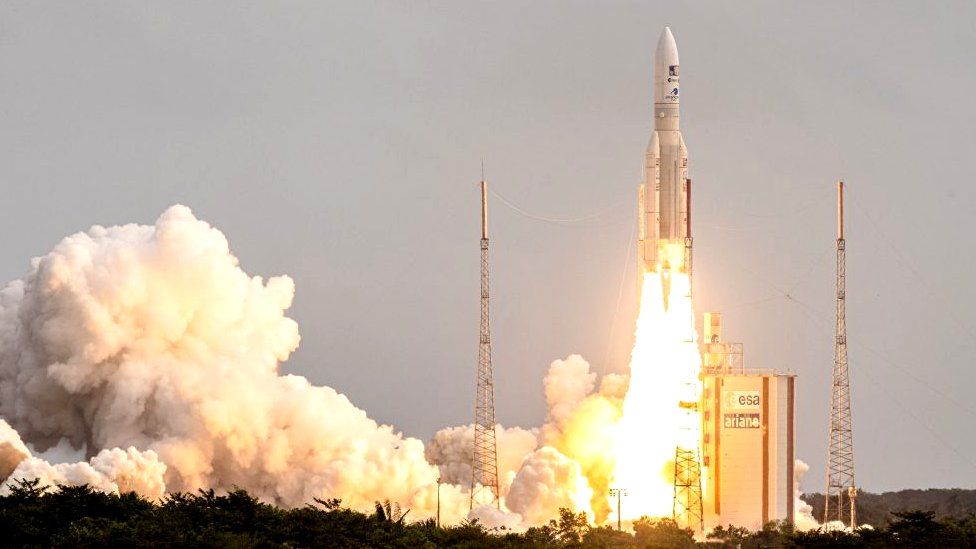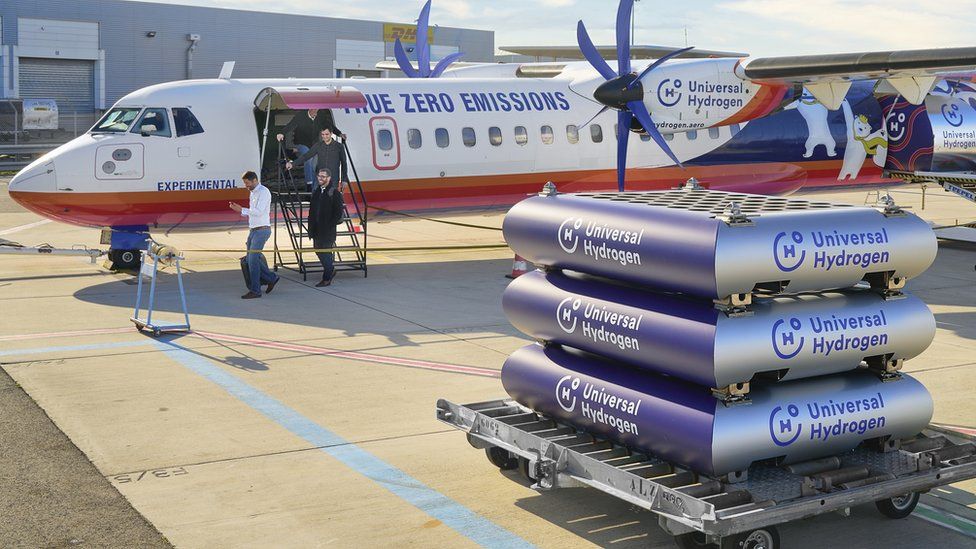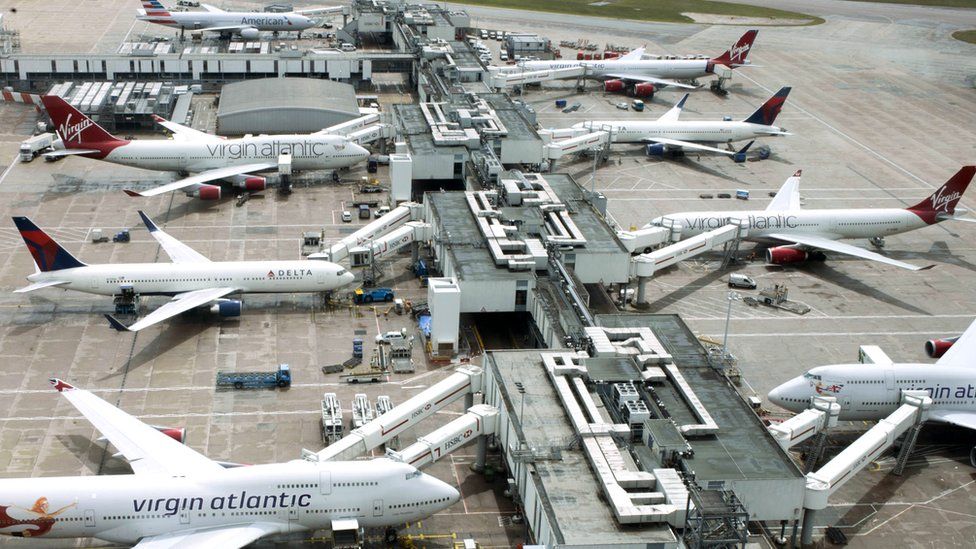On a typical day 1,300 planes take off and land at Heathrow Airport, and keeping that going requires around 20 million litres of jet fuel every day.
That’s the equivalent of filling up your car around 400,000 times.
It’s a massive operation, with fuel piped to the airport direct from refineries and then stored at two facilities know as fuel farms.
“The amount of fuel that passes through Heathrow is enormous. It’s about half of the UK’s jet fuel requirement,” says Matt Prescott, head of carbon strategy at Heathrow.
Heathrow Airport itself does not buy and sell fuel, that’s down to the airlines and their suppliers.
However, it does have to think about the infrastructure, allotting space for storage and pipes, and making sure the airlines and fuel firms have everything they need.
“It’s really about building up the sufficient capacity to ensure that the airport has that resilience built in,” says Mr Prescott.
But, when it comes to fuel, airports around the world are having to have a major rethink.
In the UK, under the government’s Jet Zero plan, by 2040 the UK aviation industry has committed to achieving net zero carbon emissions.
The US aviation industry plans to reach net zero by 2050. The European Union has a similar goal.
These are ambitious targets and to reach them will require alternatives to traditional jet fuel.

Sustainable Aviation Fuel (SAF) – fuel that does not come from fossil fuels – is one option. Airlines are already using it, usually blended with regular jet fuel.
For airports it’s simple to supply SAF – it can be delivered via existing pipes.
But many doubt whether SAF can be produced cheaply enough, or in large enough quantities, to meet the needs of the airline industry.
So, there is much interest in hydrogen, which can store a lot of energy and, when used as fuel, does not produce any CO2.
To be of any use to the aviation industry, hydrogen needs to be in its liquid form, which involves chilling it to minus 253C.
Handling a liquid at that kind of temperature is immensely challenging. Given the chance, liquid hydrogen will “boil-off” and escape as a gas – potentially becoming a hazard.
So tanks, pipes and hoses all have to be extra-insulated to keep the liquid cold.

France’s Air Liquide has a lot of experience in this area. For around 50 years it has been supplying cryogenic hydrogen to the Ariane rockets of the European Space Agency (ESA).
The company produces more than a million tonnes of hydrogen a year and as well as fuelling rockets, its hydrogen is used in trucks and all sorts of industrial processes.
“This gives us a very strong background in technology and industrial knowhow in this field,” says Erwin Penforis, a senior executive at the company’s global hydrogen business.
Over the past three years, in partnership with Airbus and France’s biggest airport operator, Group ADP, Air Liquide has been investigating the potential of hydrogen in the aviation business.
It is also part of the H2Fly consortium which this summer successfully flew an aircraft using liquid hydrogen. For Air Liquide, it was an opportunity to test systems for fuelling a hydrogen aircraft.
Airlines are keen to know if hydrogen planes can be refuelled as quickly as current aircraft, as quick turnaround times are important for the industry.
“Are we able to deliver a few tonnes of liquid hydrogen in a matter of 15 minutes? 20 minutes? We have the technologies for this. We are adapting it – but the answer is yes,” says Mr Penforis.
However, installing the equipment needed to store and distribute hydrogen at airports will not be cheap. The consultancy Bain & Company estimates it could cost as much as a billion dollars per airport.

One start-up, Universal Hydrogen, says it has a solution. It involves doing all the tricky parts of handling hydrogen away from the airport, probably at the facility where the gas is actually made.
The company has developed special tanks to hold liquid hydrogen (UH calls them modules), which can then be trucked to the airport. The modules are designed to slot straight into the aircraft, where they can be plugged into the propulsion system.
No need for pipes, hoses and pumps.
The modules are extremely well insulated and can keep the hydrogen in its liquid form for four days. Two modules would hold 360kg of hydrogen and would be able to fly an aircraft 500 miles, plus an extra 45 minutes of flight time in reserve.
Universal Hydrogen is modifying a regional airliner, putting in a fuel cell that can convert liquid hydrogen to electricity and connecting that up to electric motors that will drive the propellers.
Larger doors are being fitted so the modules can be loaded into the plane. If all goes to plan, test flights will start next year.
Mark Cousin, chief technology officer, at Universal Hydrogen, says hydrogen is most likely to be used for regional flights, but regular jet fuel will still be needed for long-haul operations.
“Handling the fuel in a different way – like we’re proposing – makes sense because you’re not trying to convert the existing fuelling infrastructure, which the airlines need to keep anyway for other parts of their fleet,” he says.
It’s not clear yet whether hydrogen will become a mainstream fuel for aviation. Aircraft powered by hydrogen are still in the early stages of development.
Unlike current planes, which can store fuel in the their wings, hydrogen planes will have to store their fuel in the fuselage, cutting space for passengers.
In addition, there is also the question of whether there will be enough environmentally-friendly, green hydrogen to meet demand.

Prakash Dikshit, who works on the planning and development of airports for the consultancy Landrum and Brown, says it’s not clear what path the aviation industry will take.
“I think everyone in the aviation industry realises that net zero is something that they need to aspire to. The how we get there, and the economics of getting there are less clear at this point.
“Hydrogen fuelled aircraft – while there might be some demo flights in the next decade, large scale implementation of hydrogen definitely seems farther away. And maybe not even certain.”













87 comments
You are a very capable individual!
I’ve been exploring for a little for any high-quality articles or weblog posts in this kind of house . Exploring in Yahoo I ultimately stumbled upon this website. Reading this info So i am glad to exhibit that I’ve a very excellent uncanny feeling I discovered exactly what I needed. I so much indisputably will make certain to do not forget this web site and give it a look regularly.
I’ll right away take hold of your rss as I can’t find your e-mail subscription hyperlink or newsletter service. Do you have any? Kindly allow me know so that I may subscribe. Thanks.
great post, very informative. I wonder why the opposite experts of this sector don’t realize this. You should continue your writing. I am confident, you’ve a huge readers’ base already!
You should take part in a contest for one of the best blogs on the web. I will recommend this site!
I like this site so much, bookmarked. “To hold a pen is to be at war.” by Francois Marie Arouet Voltaire.
I¦ll immediately grasp your rss feed as I can’t in finding your email subscription link or e-newsletter service. Do you’ve any? Please let me know so that I may subscribe. Thanks.
Greetings! Very helpful advice on this article! It is the little changes that make the biggest changes. Thanks a lot for sharing!
Well I definitely enjoyed reading it. This subject procured by you is very practical for good planning.
Hey there! Someone in my Facebook group shared this website with us so I came to take a look. I’m definitely enjoying the information. I’m book-marking and will be tweeting this to my followers! Superb blog and fantastic design.
Hello my family member! I want to say that this article is amazing, great written and come with almost all significant infos. I would like to see extra posts like this .
I also conceive thus, perfectly indited post! .
I really like your writing style, good info , thanks for putting up : D.
Yay google is my queen assisted me to find this outstanding internet site! .
Greetings! I’ve been following your blog for some time now and finally got the bravery to go ahead and give you a shout out from Humble Tx! Just wanted to mention keep up the good job!
obviously like your website however you need to check the spelling on quite a few of your posts. A number of them are rife with spelling issues and I in finding it very bothersome to tell the reality however I’ll surely come again again.
hello!,I like your writing very so much! proportion we keep up a correspondence more about your post on AOL? I need an expert in this house to unravel my problem. Maybe that is you! Taking a look forward to peer you.
Great remarkable issues here. I am very satisfied to look your post. Thanks so much and i’m having a look forward to contact you. Will you kindly drop me a e-mail?
Nice read, I just passed this onto a friend who was doing a little research on that. And he just bought me lunch because I found it for him smile So let me rephrase that: Thank you for lunch!
Wonderful work! That is the kind of information that should be shared around the net. Disgrace on the search engines for not positioning this post higher! Come on over and visit my site . Thank you =)
I really like what you guys are usually up too. This sort of clever work and coverage! Keep up the excellent works guys I’ve you guys to my personal blogroll.
It is really a great and useful piece of information. I’m glad that you just shared this helpful information with us. Please keep us informed like this. Thanks for sharing.
Wow! This can be one particular of the most helpful blogs We’ve ever arrive across on this subject. Basically Fantastic. I’m also a specialist in this topic therefore I can understand your effort.
Hmm it seems like your site ate my first comment (it was super long) so I guess I’ll just sum it up what I wrote and say, I’m thoroughly enjoying your blog. I too am an aspiring blog writer but I’m still new to everything. Do you have any tips for first-time blog writers? I’d certainly appreciate it.
I’ve been absent for a while, but now I remember why I used to love this site. Thanks, I’ll try and check back more frequently. How frequently you update your web site?
I loved up to you will obtain performed right here. The cartoon is tasteful, your authored subject matter stylish. nevertheless, you command get bought an nervousness over that you wish be turning in the following. in poor health no doubt come further previously again as exactly the similar just about a lot continuously inside of case you defend this hike.
Merely a smiling visitor here to share the love (:, btw great design.
I actually wanted to write a small remark to be able to thank you for some of the fabulous tips and tricks you are placing at this website. My prolonged internet look up has now been honored with extremely good facts to exchange with my classmates and friends. I ‘d assume that many of us readers are unequivocally blessed to dwell in a really good place with very many brilliant professionals with very beneficial tricks. I feel rather grateful to have used the website page and look forward to so many more exciting times reading here. Thanks once more for all the details.
I am glad to be one of several visitors on this outstanding website (:, thankyou for posting.
Hello my family member! I wish to say that this post is amazing, great written and include approximately all significant infos. I would like to see extra posts like this .
Thanks on your marvelous posting! I certainly enjoyed reading it, you may be a great author.I will make sure to bookmark your blog and definitely will come back someday. I want to encourage one to continue your great writing, have a nice holiday weekend!
Good – I should definitely pronounce, impressed with your website. I had no trouble navigating through all the tabs and related info ended up being truly easy to do to access. I recently found what I hoped for before you know it at all. Quite unusual. Is likely to appreciate it for those who add forums or something, website theme . a tones way for your customer to communicate. Nice task..
Generally I don’t read article on blogs, but I wish to say that this write-up very forced me to try and do it! Your writing taste has been amazed me. Thanks, quite nice article.
Very efficiently written story. It will be useful to anybody who utilizes it, as well as me. Keep up the good work – i will definitely read more posts.
After study a few of the blog posts on your website now, and I truly like your way of blogging. I bookmarked it to my bookmark website list and will be checking back soon. Pls check out my web site as well and let me know what you think.
clomiphene generico average cost of clomid how to get generic clomiphene without prescription can i buy clomiphene tablets can you buy clomid for sale can i purchase cheap clomiphene without insurance generic clomiphene online
The reconditeness in this ruined is exceptional.
Proof blog you be undergoing here.. It’s intricate to find great quality belles-lettres like yours these days. I honestly respect individuals like you! Take care!!
azithromycin 500mg ca – buy tindamax 500mg sale order metronidazole online cheap
buy domperidone – buy generic domperidone over the counter cyclobenzaprine 15mg cost
buy propranolol without prescription – buy generic methotrexate 2.5mg methotrexate for sale
cheap amoxil pills – order generic ipratropium 100mcg how to buy combivent
buy azithromycin 250mg generic – buy tindamax generic buy nebivolol 5mg generic
clavulanate cheap – atbioinfo order ampicillin without prescription
cost esomeprazole 40mg – nexium to us esomeprazole canada
order warfarin without prescription – https://coumamide.com/ losartan 50mg pill
order mobic 15mg online – swelling meloxicam 7.5mg cheap
I have learn several good stuff here. Certainly value bookmarking for revisiting. I wonder how so much attempt you set to make any such excellent informative site.
Your style is so unique compared to many other people. Thank you for publishing when you have the opportunity,Guess I will just make this bookmarked.2
mens ed pills – mens ed pills medication for ed
where can i buy amoxil – combamoxi purchase amoxil pill
purchase forcan pill – order diflucan 100mg pill buy generic fluconazole 200mg
order generic cenforce – buy cenforce cheap order generic cenforce
cialis over the counter at walmart – click how much does cialis cost at walmart
tadalafil liquid fda approval date – https://strongtadafl.com/ cialis dapoxetine overnight shipment
This is the stripe of serenity I have reading. prednisolona niГ±os
viagra sale ottawa – sildenafil tablets 100mg buy viagra online mastercard
This website exceedingly has all of the information and facts I needed to this subject and didn’t comprehend who to ask. https://ursxdol.com/synthroid-available-online/
More delight pieces like this would create the web better. https://buyfastonl.com/furosemide.html
More posts like this would prosper the blogosphere more useful. https://prohnrg.com/product/priligy-dapoxetine-pills/
Thanks for every other wonderful article. Where else could anyone get that type of information in such an ideal method of writing? I have a presentation next week, and I am on the look for such info.
Thanks for putting this up. It’s okay done. https://ondactone.com/simvastatin/
I couldn’t hold back commenting. Well written!
metoclopramide 20mg generic
Hmm is anyone else encountering problems with the images on this blog loading? I’m trying to find out if its a problem on my end or if it’s the blog. Any feed-back would be greatly appreciated.
This is the amicable of topic I take advantage of reading. http://iawbs.com/home.php?mod=space&uid=914824
You completed some nice points there. I did a search on the issue and found nearly all folks will consent with your blog.
you’re really a just right webmaster. The website loading speed is incredible. It sort of feels that you are doing any unique trick. Also, The contents are masterpiece. you have performed a great task in this subject!
Would you be taken with exchanging links?
Howdy, i read your blog from time to time and i own a similar one and i was just curious if you get a lot of spam feedback? If so how do you prevent it, any plugin or anything you can advise? I get so much lately it’s driving me crazy so any support is very much appreciated.
Some really nice and useful info on this website , also I conceive the pattern contains great features.
dapagliflozin 10mg canada – https://janozin.com/# order dapagliflozin 10mg online
I’m extremely inspired with your writing skills and also with the layout on your blog. Is that this a paid subject matter or did you customize it your self? Either way keep up the nice quality writing, it’s uncommon to look a great blog like this one today..
Utterly indited content material, Really enjoyed looking at.
are pokies open in new zealand, legitimate online pokies australia and slot machine for sale uk,
or united statesn online no deposit pokies
My web blog: yankton casino, Silvia,
Very nice post. I simply stumbled upon your blog and wanted to mention that I have truly enjoyed browsing your blog posts. In any case I will be subscribing for your feed and I am hoping you write once more soon!
Thanks towards putting this up. It’s understandably done. https://myrsporta.ru/forums/users/qvrjz-2/
sportwetten gratiswette
Here is my blog post; basketball punkte wetten
best wettanbieter
my webpage; Dartswettquoten.Com
wetten quote erklärung
My web-site; willkommensbonus ohne einzahlung sportwetten (August)
die besten sportwetten anbieter
my page Im WettbüRo Des Teufels (https://Freesaloneducation.Mn.Co/)
handicap wette beispiel
Feel free to visit my blog lizenz wettbüro
platz wette pferderennen
Also visit my blog … sportwetten anbieter test
zuverlässige wett tipps
Here is my web blog: wettanbieter neu (Marcos)
wetten deutschland japan
Visit my site; sportwetten Steuer österreich
When I originally commented I clicked the “Notify me when new comments are added” checkbox and now each time a comment is added I get four e-mails with the same comment. Is there any way you can remove me from that service? Many thanks!
sportwetten schweiz anbieter
my page – Muss man bei einer kombiwette alles richtig haben; https://bouchesocial.com/story22364378/uefa-women-s-euro,
A lot of whatever you articulate happens to be astonishingly accurate and that makes me ponder why I hadn’t looked at this in this light previously. Your article really did turn the light on for me personally as far as this specific issue goes. Nevertheless there is actually one particular issue I am not too cozy with so whilst I make an effort to reconcile that with the actual main theme of the issue, allow me observe what all the rest of your visitors have to point out.Well done.